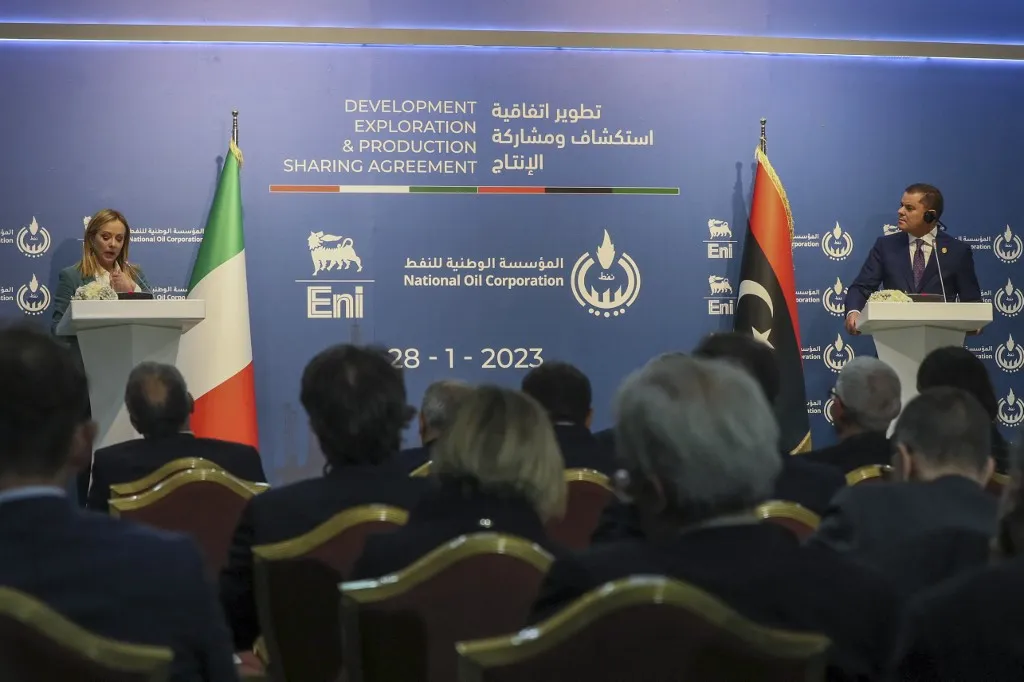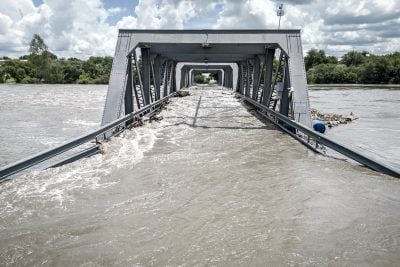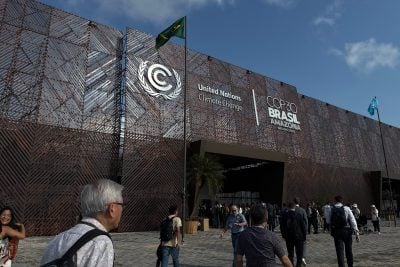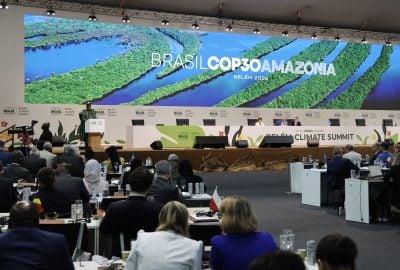Disembarking her official plane at Tripoli’s only functioning airport late last month, Giorgia Meloni looked like she was on a mission.
Still in her first 100 days as Italy’s prime minister, Meloni was in Libya to market Rome as a gas hub linking North African producers with Europe, and to stem the flow of migrants across the Mediterranean. She did not go home empty-handed. During her trip, Italian oil major Eni and Libya’s National Oil Corporation (NOC) signed an $8bn gas production deal aimed at boosting gas supplies to Europe.
The agreement is said to be the largest investment in Libya’s energy sector in a quarter of a century and a sign that Italy is taking a leading role in gas extraction in North Africa as Europe scrambles to find alternatives to Russian energy following the invasion of Ukraine.
But with Libya still engulfed in chaos a decade after a Nato-backed uprising ousted and killed longtime dictator Muammar Gaddafi, analysts say the country is not a reliable energy partner. Before Meloni had even left the troubled country, Libya’s oil minister had slammed the landmark gas deal as “illegal” (see below).

Two offshore fields to be developed
If all goes to plan, Eni’s deal will increase both gas output for the Libyan domestic market and exports to Europe, in large part through the development of two offshore gas fields.
In a statement, the Italian company said output will begin in 2026 and reach a plateau of 750m cubic feet per day. “This agreement will enable important investments in Libya’s energy sector, contributing to local development and job creation while strengthening Eni’s role as a leading operator in the country,” said chief executive Claudio Descalzi.
Meloni, who is the first top European official to visit Libya since the country failed to hold vital elections in December 2021, described the deal as “big and historic”.
The pact builds on a robust pre-existing oil and gas partnership between the two countries, underpinned by the GreenStream pipeline, which connects western Libyan gas fields to the island of Sicily and can carry 11bn cubic metres of gas per year. The pipeline was opened in 2004 but supply has plummeted since Libya erupted into chaos a decade ago.
Since then, Algeria – which Meloni visited before Tripoli – has overtaken Libya as Italy’s primary North African energy partner and biggest gas supplier. Italy is also banking on future gas imports from Egypt, Angola, Republic of Congo and Mozambique.
Finding alternatives to Russian gas
Efforts to diversify gas supply picked up following the onset of the war in Ukraine, which sparked a dash for alternatives to Russian energy.
Italy, once heavily reliant on Russian hydrocarbons, has reduced its imports of Russian gas by two-thirds to around 11bn cubic metres a year and plans to eliminate Russian gas from its energy mix by 2024.
Algeria, which has a capacity of more than 36bn cubic metres, according to Descalzi, has replaced a significant chunk. Eni hopes increased exports from Libya can help too.
On a more strategic level, Rome also sees a role for itself as a link between North African gas producers and northern Europe, building on strong relationships in the region, and hopes to build an energy corridor to Germany, Austria and Switzerland.
In a statement of intent at a roundtable in Tripoli, Meloni said that while Italy wants to expand its profile in the region, it does not seek a “predatory” role but instead wants to help African nations “grow and become richer”.
That message could resonate with African governments who resent attacks from climate activists and demands by Western officials to reduce emissions when 600m Africans still lack access to electricity. Energy-rich countries like Uganda say they cannot develop without resource extraction.
So strong is the desire to replace Russian gas that investment is flowing away from traditional crude projects in Africa and towards gas development, particularly floating LNG projects offshore that are less vulnerable to security risks.
Oil majors, including ExxonMobil, Eni, Shell and Chevron, all closed traditional projects in Nigeria, Angola and Equatorial Guinea last year. Meanwhile, oil cash investment is flooding into gas-rich nations, including Mozambique, Tanzania, Mauritania and Senegal in the hopes they can fill European shortfalls.
Libya ‘in no way a reliable partner’
Libya, too, could benefit from that shift. However, analysts were quick to pour cold water on the significance of the Eni deal, given Libya’s chronic instability, underinvestment, high domestic demand and lack of exports since a civil war broke out in 2011.
Last year, for instance, Libya delivered just 2.63bn cubic metres to Italy, well below both the pre-2011 level of 8bn cubic metres a year and Italy’s demand for 5bn cubic metres a year from Libya.
The trip was “mainly a political spectacle meant to produce an announcement effect in the media and give the impression that Italy’s new prime minister is assertive, effective, firm, active, and no-nonsense,” says Jalel Harchaoui, a Libya expert and an associate fellow at the Royal United Services Institute.
“There is no reason to believe that the headline figure of $8bn is going to be invested within the foreseeable future. Half of that figure is to be invested by Libya’s own National Oil Corporation, and right now nobody has any compelling reason to believe that this will happen.”
Experts say Libya’s political instability and insecurity remains a major constraint. “Libya is of course in no way a reliable partner,” states Matteo Villa, a senior research fellow at Italian think-tank ISPI.
For years control of Libya has been divided between rival governments. In Tripoli, in the west, the Government of National Unity (GNU) is backed by the United Nations. Benghazi, in the country’s east, is under the control of Khalifa Haftar, who has earned the backing of Gulf states.
Following a split in 2014, Haftar waged a war on western factions, launching a bloody but unsuccessful one-year offensive on Tripoli. Today the country remains divided between rival factions who vie for control and dispute each other’s political legitimacy. Last February, the eastern-based House of Representatives confirmed a new eastern government, prolonging the institutional division.
The deal with Eni is likely to deepen the rift between the rival administrations, as has been the case with oil and military deals between Libya and Turkey, It has already exposed in-fighting in GNU prime minister Abdul Hamid Dbeibeh’s government. Mohamed Oun, Dbeibeh’s oil and gas minister, did not attend the Eni deal signing but instead criticised it on local television, saying that such agreements should be made by the ministry, not the NOC.
The eastern-based parliament has roundly rejected the appointment of Farhat Bengdara as chairman of the NOC – and by extension any deals it or Tripoli might strike with foreign companies and states.
Competition between rival administrations and bouts of violent conflict have led to the blockade and shutdown of oil facilities in recent years, hindering the sector’s growth. Oil production in the second quarter of 2022 averaged just 0.88m barrels per day, a third less than during the first. According to the World Bank, lost oil revenue due to the blockade of facilities has cost the country around $4bn.
Libyan economy in the doldrums
Meanwhile, Libya’s economy is in the doldrums, despite high energy prices. Inflation is high at 37% year on year for a basket of basic expenditures as of April 2022.
As a result, the World Bank notes: “Political instability in Libya and the ongoing war in Ukraine will likely slow down Libya’s economic recovery. If the country could sustain current levels of oil production and exports, it will benefit from soaring global oil prices, translating into higher fiscal revenues and more significant inflows of hard currency. This will positively impact its growth and its fiscal and external balances.”
But that will depend, the international lender noted, on transparent and accountable management of oil revenues and an improvement in the political and security conditions.
With no end in sight to the country’s security challenges, growth is unlikely. Although Libya’s GDP grew by a staggering 177.3% in 2021 – after a 59.7% contraction in 2020, driven primarily by Covid-19 – the African Development Bank expects more modest economic growth of 4.4% in 2023.
In addition to the insecurity and uncertainty facing energy firms looking to invest in Libya, heavy domestic demand will continue to frustrate oil and gas exports, as it does in Egypt.
“The problem is that securing a long gas pipeline means cutting deals with local powers and militias, which also entails leaving a lot of produced gas to the domestic market,” says Villa. “Around 60% of the gas produced is used domestically, often in a subsidised way, and therefore somewhat wasted.”
With Eni unable to depend on Libya in the long run, experts say Meloni’s trip could be reduced to a mere spectacle. Algeria is a reliable partner for Italy at current levels – about 24bn cubic metres per year – but not more, and Libya cannot be relied on to export more than 3bn cubic metres per year.
“It’s mostly political signalling that we are committed to stay the course with the partners that we are left with, now that we almost ‘lost’ Russia,” says Villa.
For now it seems that North Africa is not Italy’s silver bullet. For Europe, the quest to find reliable alternatives to Russian oil and gas will continue.
Want to continue reading? Subscribe today.
You've read all your free articles for this month! Subscribe now to enjoy full access to our content.
Digital Monthly
£8.00 / month
Receive full unlimited access to our articles, opinions, podcasts and more.
Digital Yearly
£70.00 / year
Our best value offer - save £26 and gain access to all of our digital content for an entire year!
 Sign in with Google
Sign in with Google 



